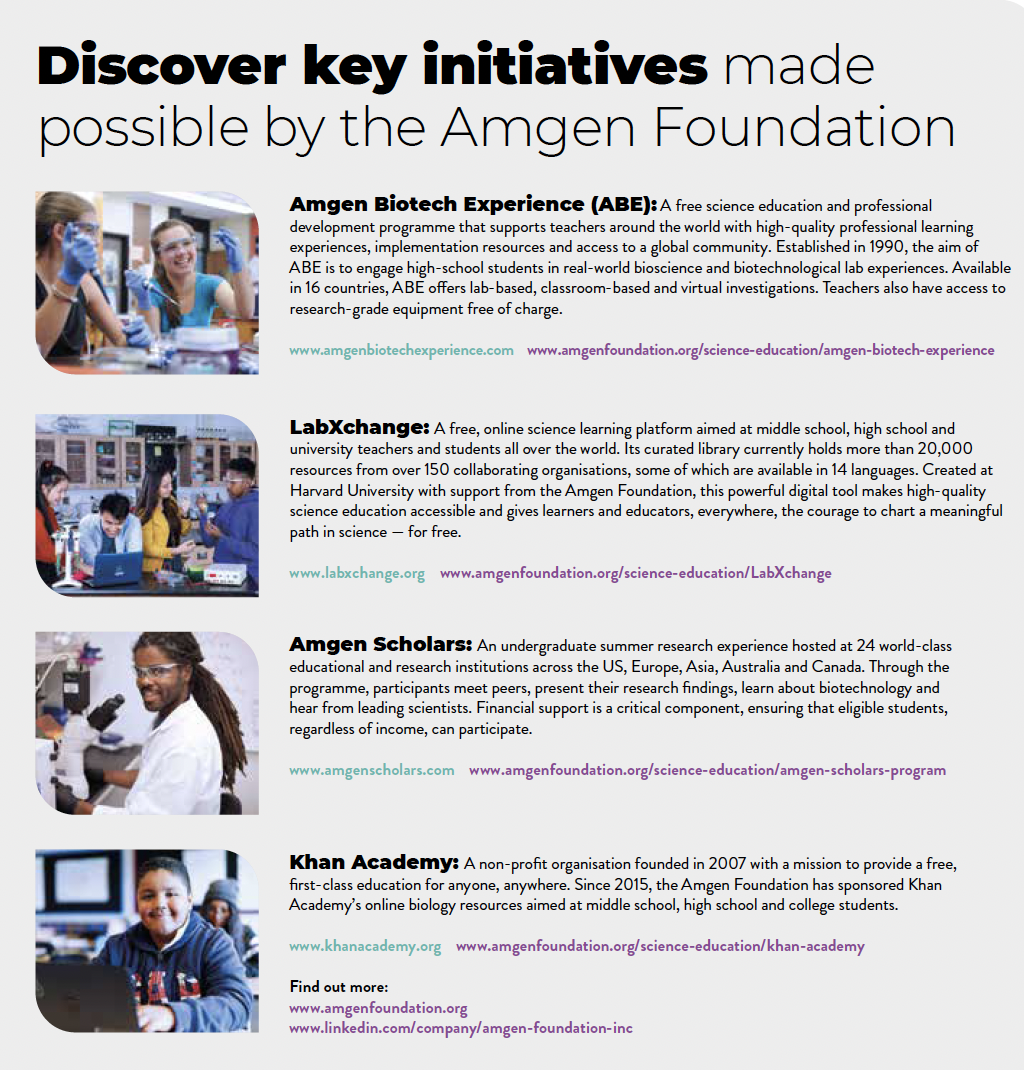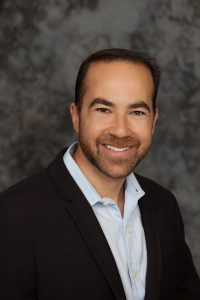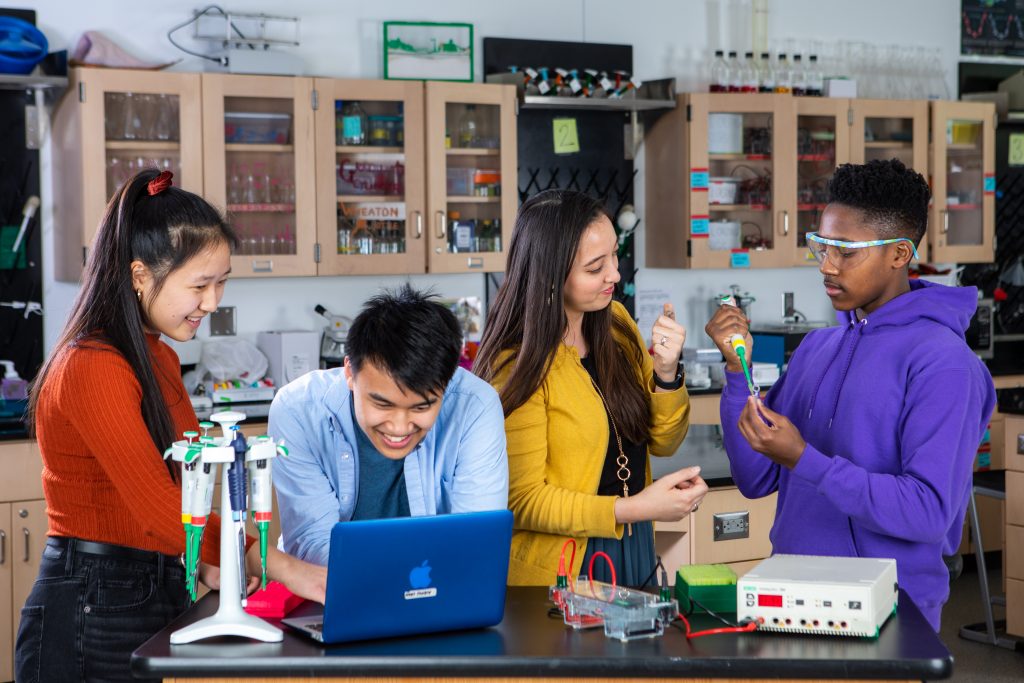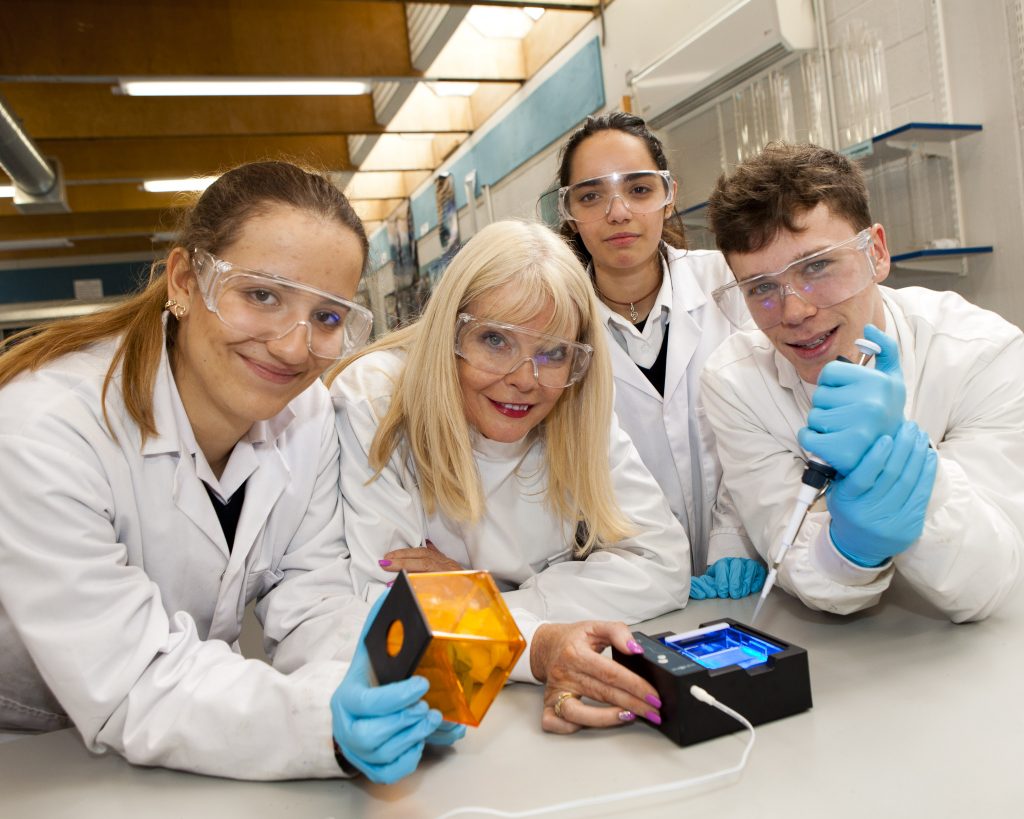Introducing the free bioscience and biotech education initiatives supported by the Amgen Foundation
Established by Amgen, one of the world’s leading biotechnology companies, the Amgen Foundation is committed to advancing excellence in science education and making a difference in Amgen communities. The Foundation’s president, Scott Heimlich, describes how its four core philanthropic initiatives are having a lasting, positive impact on teachers and students.
Why was the Amgen Foundation set up?
Amgen was founded over 40 years ago, and the Amgen Foundation over 30 years ago. So, Amgen’s commitment to serving patients, and our commitment to making a difference in our communities through philanthropy, has been core to who we are for decades. The Foundation started out by making grants in our local headquarters community, just as many corporate foundations do, but, today, we support initiatives in Amgen communities and beyond across the globe. Our goal – in alignment with our mission – is for the Amgen Foundation to reach as many people as possible through the nonprofits we support, both locally and worldwide.
What is the Foundation’s mission?
While central to our mission is strengthening the communities where Amgen staff live and work, our ambition is to lead by making a difference at a larger scale, particularly where the need is greatest. The biopharmaceutical industry requires a highly educated scientific workforce, but we know that today’s workforce doesn’t represent all segments of society. Just look at past Nobel Prize winners in Medicine or Chemistry and the breakdown of those winners by gender or race or nationality; the numbers are way off. For instance, less than 3% of Nobel science winners are women, and only one woman of colour has received the award. Talent is universal, yet opportunity is not. Knowing this, we want to inspire more young people across the world to consider a career in science, and create more opportunities to meaningfully engage and prepare them. We firmly believe that everyone needs science, and science needs everyone.
Why is science literacy an integral part of this mission?
Not only does our industry rely on a highly educated workforce, but biotechnology will also better achieve its full potential with a scientifically literate population. We need to support more people to understand and appreciate the role of science and biotech in our lives. Whether one is talking about the importance of vaccines, enrolling in clinical trials, or the significance of supporting basic research, a higher level of scientific literacy as well as a greater understanding of how medicines go from the bench to the bedside is critical to so many aspects of our lives.
How do teachers find the time to include the Amgen Foundation’s resources in their science curriculums?
It’s true that many teachers are crunched for time, but once they learn more about what the Foundation supports and has to offer, there’s often an understanding of just how valuable a tool this can be for them and their students. Importantly, I’m referring to programmes that were created by and for teachers – with industry input – and that teachers opt in to engage with because they see the value. Take the Amgen Biotech Experience, for example. It’s an opportunity for teachers to experience a professional learning opportunity right in their own community, meet other peer teachers who are already implementing the biotech labs with their students, and access free equipment and resources to engage their classrooms in the labs. Once teachers take these steps and see their students’ reactions and the skills gained, it becomes less about ‘how do I possibly fit this in?’ and more about ‘I’m going to fit this in because my students will really gain from this experience, and the programme staff will support me in doing so’.
Originally, the Amgen Biotech Experience was designed for US classrooms, but through our discussion and engagement to localise the programme with partners worldwide, we now support teachers to run these labs in 16 countries (and 27 communities) across the globe, including our US communities and countries such as Türkiye, Ireland, Germany, France, Japan and Mexico. There’s a real hunger for initiatives that meaningfully engage students in hands-on science, and we are proud to have made possible such a rich and vibrant community of teachers, lab technicians and other stakeholders across the world.
How does LabXchange complement the Amgen Biotech Experience?
The Amgen Foundation is on a mission to break down barriers and bring science education to everyone, everywhere, through its support of large-scale initiatives such as LabXchange.
© Amgen Foundation
The Amgen Biotech Experience (ABE) empowers teachers to bring biotechnology into their classrooms.
© Amgen Foundation
© Amgen Foundation.
LabXchange has several virtual assets that both complement and supplement the hands-on labs. Our aim is to integrate hands-on and virtual learning to achieve the best learning outcomes possible. You can learn more by visiting the Amgen Biotech Experience section on LabXchange: abe.labxchange.org. Note that the Foundational Concepts and Techniques in Biotech content is available in 14 languages, including English, Spanish, French, Arabic and many others. And, new to the programme, the Exploring Precision Medicine labs can be found here: www.labxchange.org/library/clusters/lx-cluster:lxc-pm
How is the Foundation reimagining science education?
At the heart of what we do is to reimagine education so that anybody, regardless of their class, gender, race or other characteristics, has the opportunity to meaningfully engage in science.
Let’s say there was such a thing as the Universe Olympics, and we had to foster the best swimming team on planet Earth. That team today would mainly comprise individuals from select nations because that is where the infrastructure and opportunity to practise swimming in pools currently are; in other words, we’re only reaching a fraction of the potential population of swimmers, and we’re certainly missing out on some of the very best who never had access in the first place. That same analogy can be applied to science and, in particular, the discovery and development of new medicines. Due to lack of access and opportunity for too many people, there are aspiring scientists who simply never get the chance to engage authentically with scientific discovery. This doesn’t just hurt them, this hurts all of us, as medicines are not discovered and developed, and ultimately patients are not treated. So, we are committed to widening the net with our initiatives by democratising access to the best in science education, both in-person and virtually.
Can you provide some examples?
We’ve invested over $40 million in the Amgen Biotech Experience, which has reached nearly one million students to date over three decades. We’ve donated over $70 million to the Amgen Scholars Programme, through which world-class universities host college students for a summer research experience. Through the Scholars programme, 5,300 students have participated to date from over 900 colleges and universities. And through a commitment of over $40 million to LabXchange, over 35 million users have accessed this science learning platform, with 85% of these users hailing from countries classified as low or lower-middle income by the World Bank. Tens of millions of people are also using the engaging biology content we’ve been proud to support Khan Academy to develop since 2015.
Our job is to not only make these opportunities and resources high-quality, but to keep them cost-free and accessible. Normally, you would expect to pay for things that are the best, but wouldn’t it be ideal if some of the best educational content was free for all.
In your view, what are the essential skills that young people need to thrive?
Communication, collaboration, critical thinking, creativity and curiosity are all essential and much spoken about it in today’s day and age. Of course, core disciplinary knowledge and hard skills like science and maths will never lose their importance, but intangible skills such as the aforementioned are integral to adapting to inevitable changes, especially with the arrival of AI. In fact, being adaptable and being a life-long learner will always be key to future success.

Meet Scott

My background is in education. After my bachelor’s degree, I taught at a junior high school in rural Japan for a year, as part of the Japan Exchange and Teaching programme (JET). When I came back to the US, I completed my master’s and doctorate degrees in education at the University of California, Los Angeles (UCLA). I worked for multiple higher education institutions before joining Amgen.
I always had an interest in education, government and the non-profit sector, but I would never have guessed that I’d work for the philanthropic arm of a company focused on making a difference in education. Growing up, I honestly didn’t know much about corporate philanthropy. But being at a company that takes philanthropy as seriously as it does, and which set up and funds a foundation to make a real difference in the world through big, focused bets, has been, and continues to be, inspiring.
I aspire to have the biggest impact I can possibly have, and this role allows me to be part of a team, an organisation and a company that’s focused on doing just that. Too often, corporate philanthropy can be looked at as PR-driven. That is not the case at many companies nor at the Amgen Foundation, where we lead with substance and focus on long-term focused and strategic giving in alignment with our mission. We’re also proud to engage thousands of our staff members who give their time, talent and resources to joining the Foundation in making a difference. The Foundation has given over $425 million to date to support non-profits large and small across the US and the world – such efforts have enabled us to reach tens of millions of people and to dramatically improve lives.
That said, you certainly don’t need to be the head of a foundation to make a big difference. People are making an incredible difference tutoring a student, serving on a non-profit board, writing a book. As an example, The Ministry for the Future by Kim Stanley Robinson is an eye-opening book portraying how climate change will affect us all – think of the difference a novel such as that will make should it reach a wide audience.
When you are starting out, it’s always a good idea to consider trying something new. Even if you end up hating whatever it is you’re doing, or wherever it is you’re living, you’ll be better off in the long run for having tried something and expanded your horizon of what’s possible. I remember hearing someone tell a student in California that they would hate going to a college in the northeast because it’s much colder there, so that student didn’t end up going and stayed in their hometown to attend college. Maybe it worked out great, but that’s not the advice I would have given (assuming the student had the scholarship support to go out-of-state).
To get where you want to go, you have to know where you’re going. Thinking about what you want to do, going for it, trying new things and not leaving it to chance is important. At the same time, if you’re so rigid in what you want to do, opportunities can end up escaping you. A level of adaptability, openness and calculated risk-taking is so integral in today’s world. A wonderful professor at UCSF used to cite a great quote from the literary critic Andre Gide: “One does not discover new lands without consenting to lose sight of the shore for a very long time.”
One of the best pieces of advice I received is once you make a tough decision, make it the right one. This came from my mentor, Professor Bruce Barbee at UCLA, who we lost about a year ago – but not before he made a difference in the lives of countless students, including me.




